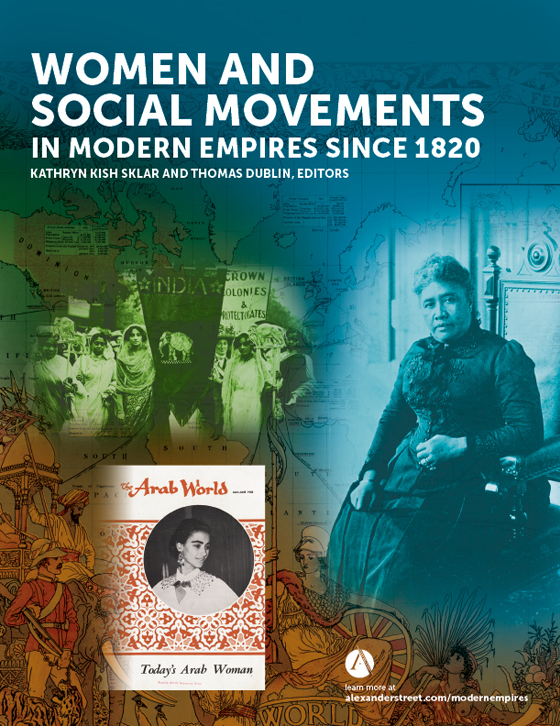
Women and Social Movements in Modern Empires since 1820
Through 75,000 pages of highly curated text-based documents, Women and Social Movements in Modern Empires Since 1820–a supplement to Women and Social Movements, International–explores prominent themes in world history since 1820: conquest, colonization, settlement, resistance, and post-coloniality, as told through women’s voices.
Scholars are turning to themes related to empire as a new way to explore modern history.
Seen through women’s eyes, the history of modern empires opens dramatic new perspectives on global patterns that have shaped our world. Women’s voices can be found at all levels of imperial history. As the agents of empire, women were active as missionaries, educators, healthcare professionals, and women’s rights advocates. As the opponents of empire, women were active in nationalist and resistance and reform movements and as conservators of culture.
With a clear focus on bringing the voices of the colonized to the forefront, this archive and database includes documents related to the Habsburg Empire, the Ottoman Empire, the British, French, Italian, Dutch, Russian, Japanese, and United States empires, and settler societies in the United States, New Zealand, and Australia.
A large, innovative section focuses on the voices of Native Women in North America.
Research and teaching applications
This one-of-a-kind resource has research, teaching, and learning applications and can stand on its own or serve as a supplement to the 150,000-page Women and Social Movements, International. Researchers will:
- Acquire access to colonial and postcolonial sources.
- Compare the lives of women in different empires in colonial and postcolonial contexts.
- Study transnational issues, such as prostitution, relations between colony and metropole, governance, popular culture, citizenship, employment, health and medicine, education, domestic life, intimacy and sexuality, children, and intermarriage.
The variety of sources and the scope of coverage (representing all continents) make Women and Social Movements in Modern Empires since 1820 applicable to courses in women’s history, women’s studies, world history, religion, social and cultural history, post-colonial studies, sociology, and political science.
Document clusters
The collection is organized around more than 35 document clusters, selected by experts in the field, each of whom has written a scholarly essay that provides context and interpretation for the documents in their cluster. Documents not in English are accompanied by an English abstract.
Sources have been drawn from numerous archives, including the Archivo Nacional de la República de Cuba, Habana, Cuba; the Burke Library Special Collections, Columbia University; Harvard Divinity School Library; Centre des Archives Diplomatiques de Nantes (CADN); Diliman Library, University of the Philippines; the National Archives Repository, Pretoria; Yale University Library, and many others. Virtually all the content is available online for the first time. Most of the content is in-copyright, and video and audio content is also included.
Highlights from the collection
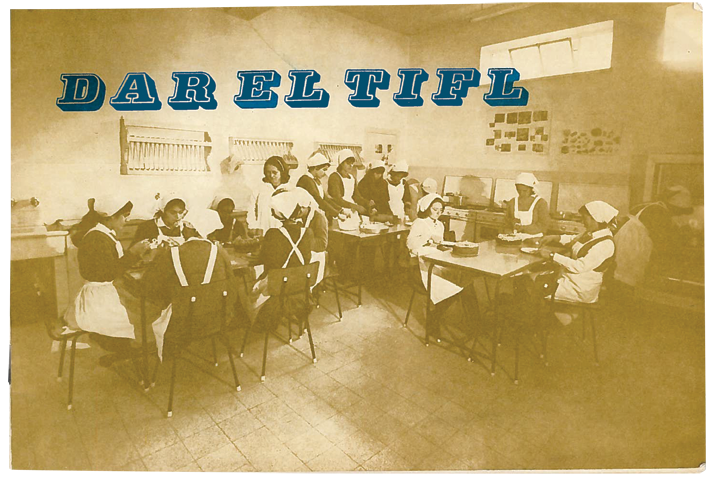
Empires in the Middle East, 1860 to the Present
Hind Husseini, “Dar El Tifl (Children’s Home)” (Annual Report, Jerusalem, Jordan, 1963-64), Countries Collection, Box 24: “Jordan,” Sophia Smith Collection, Smith College, Northampton, Massachusetts

Italians Consider the International Problem of Trafficking in Women, 1928–1936
Ufficio Società delle Nazioni, “Impiego delle donne in servizi di polizia” (Rome, Italy, 1932), Record Series “Società delle Nazioni,” Busta 126 “Comitato della Tratta delle donne e deifanciulli,” Archivio Storico Diplomatico del Ministero degli Affari Esteri.

United States Empire: American Missionaries in India, 1910–1953
“Report of Nipani Station for 1943 for the Presbyterian Board of Foreign Missions” (Report, Nipani, India, 1943), Foreign Missionary Vertical Files, “Melanie Updegraff,” Presbyterian Historical Society, Presbyterian Church (U.S.A.) (Philadelphia, PA).
French Empire In North Africa, 1935-2005
Fadhma Amrouche, My Life Story: The Autobiography of a Berber Woman (London: Women’s Press, 1988; originally published, 1968).
United States Empire: Native Women Oppose Colonialism in Guatemala, 2003


About the editors
The construction of this extraordinary resource is supported by a large international group of scholars, led by co-editors Kathryn Kish Sklar and Thomas Dublin. Document cluster editors include:
Lucia Carminati (University of Arizona) — Italians Consider the International Problem of Trafficking in Women, 1928-1939
Elisabeth Armstrong (Smith College) — Postcolonial India Julia Clancy-Smith (U. of Arizona) — French Empire in North Africa, 1935-2005
Krassimira Daskalova (University of Sofia, Bulgaria), Enriketa Papa-Pandelemoni (Tirana University), Katerina Dalakoura (University of Crete), Roxana Lucia Cheschebec (Independent Scholar) — Empires in the Balkans: Bulgaria; Greece; Romania; Serbia; Albania
Carolyn Eichner (University of Wisconsin, Milwaukee) — French Feminists and Empire, 1860-1914
Marianne R. Kamp (Indiana University) — Russian Empire in Uzbekistan
Pamela McKane (York University) — British Empire in Northern Ireland
Kate Mcgregor (University of Melbourne), Faye Yik-Wei Chan (University of Melbourne) — Anti-Imperialist Activism of Indonesian Women, 1951-1965
Barbara Molony (Santa Clara University), Taeko Shibahara (Doshisha University) and Elizabeth Dorn Lublin (Wayne State University) — Japanese Empire
Sarah Paddle (Deakin University, Australia) — Western Women in China
Katherine Sadler (Clark College, Vancouver) — South Africa: Indigenous Women in Anti-Imperialist Activism, 1929-1960
Elizabeth van Heyningen (University of Cape Town, South Africa) — Empires Collide in the South Africa War, 1900-1903
Susan Zimmerman (Central European University) with Michaela Koenigshofer (Independent Scholar, Vienna); Alexandra Ghit (Central European University); Sandra Prlenda Perkovac (Central European University; Dietland Huechtker (University of Liepzig); and Jitka Gelnarova (Charles University — Hapsburg Empire: Germany; Hungary; Romania; Croatia and Slovenia; Poland; Ukraine; Czech Republic; Slovakia
Teresa A. Barnes (University of Illinois) — Women in the Anti-Apartheid Movement in South Africa, 1960-1997
Susan Schulten (University of Denver) — Emma Willard's Maps of North Africa, 1828
Cathleen Cahill (Pennsylvania State University) — Women's National Indian Association, 1880-1940
Julia Clancy-Smith (University of Arizona) — French Empire in North Africa, 1935-2005
U.S. Empire
Ann Taylor Allen (University of Louisville) — American Missionaries in India, 1910-1953Jessica B. Elkind (San Francisco State University) — American Women in Vietnam, 1955-1965
Katherine Marino (Ohio State University) — Panama Canal Zone
Rowena McClinton (Southern Illinois University, Edwardsville), Indigenous and Settler Women Interact
Rachel O’Donnell (York University, Toronto) — Native Women Oppose Colonialism in Guatemala
Febe Pamonag (Western Illinois University), Frances Althea Redison, Mary Barby Badayos-Jover (University of the Philippines in the Vasayas), and Adrianna Francisco (University of California Berkeley) — Philippine Women and American Empire, 1904-2003
Julie Rancilio (Kapioloni Community College) — Korean women in Hawaii
Connie Shemo (SUNY Plattsburg), Shenglan Li (SUNY Binghamton) and Aihua Chang (SUNY Stony Brook) — Chinese Women Interact with American Missionary Women
Lynn Stoner (Arizona State U) — Anti-Imperialist Writings of Cuban Feminists, 1896-1985
Brandy Thomas Wells (Ohio State U) — African American Women in South Africa
Native Women in North America
Laurie Arnold (Gonzaga University) — Colville
Gregory Fields (Southern Illinois University Edwardsville) — Lummi Coast
Dee Garceau (Rhodes College) — Salish, Blackfeet, and Urban Idaho Falls
Kathryn Magee Labelle (University of Saskatchewan) — Wendat/Wyandot
John Low (Ohio State University) — Pokagon Potawatomi
Rowena McClinton (Southern Illinois University Edwardsville) — Quapaw
Lucy Eldersveld Murphy (Ohio State University) — Native Women Leaders in Ohio
Daniel Rivers (Ohio State University) — Choctaw
Rose Stremlau (Davidson University), Jamie Martinez (University of North Carolina, Pembroke) – Lumbee of North Carolina
Related Collections
-
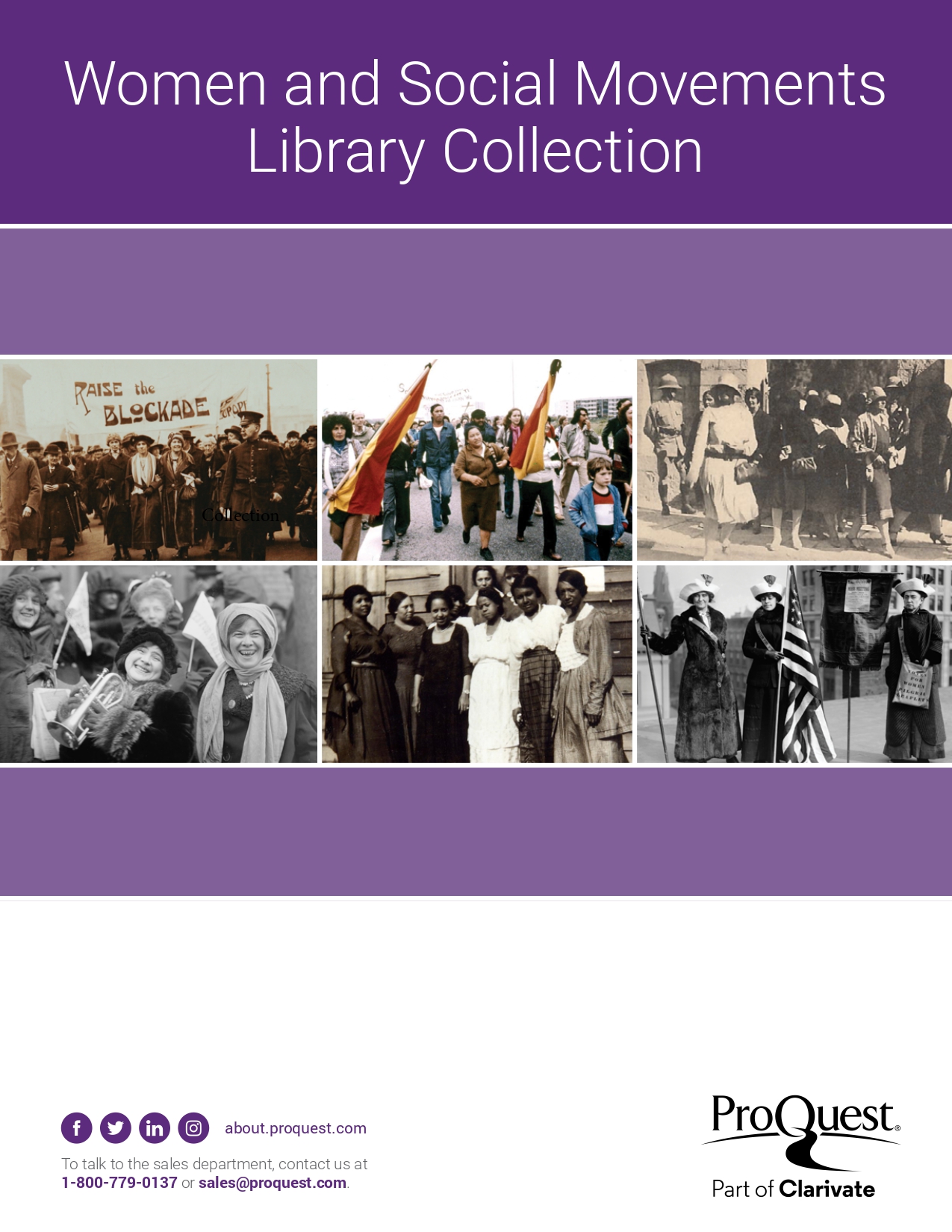 Women and Social Movements Library Collection
Women and Social Movements Library Collection -
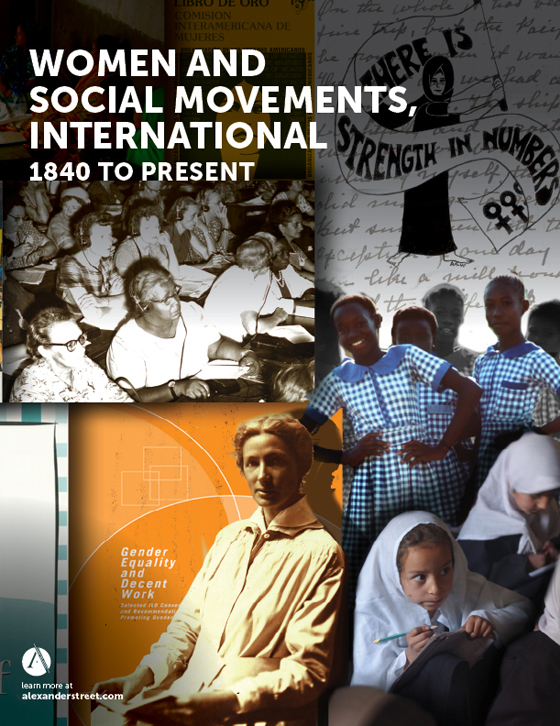 Women and Social Movements, International 1840 to Present
Women and Social Movements, International 1840 to Present -
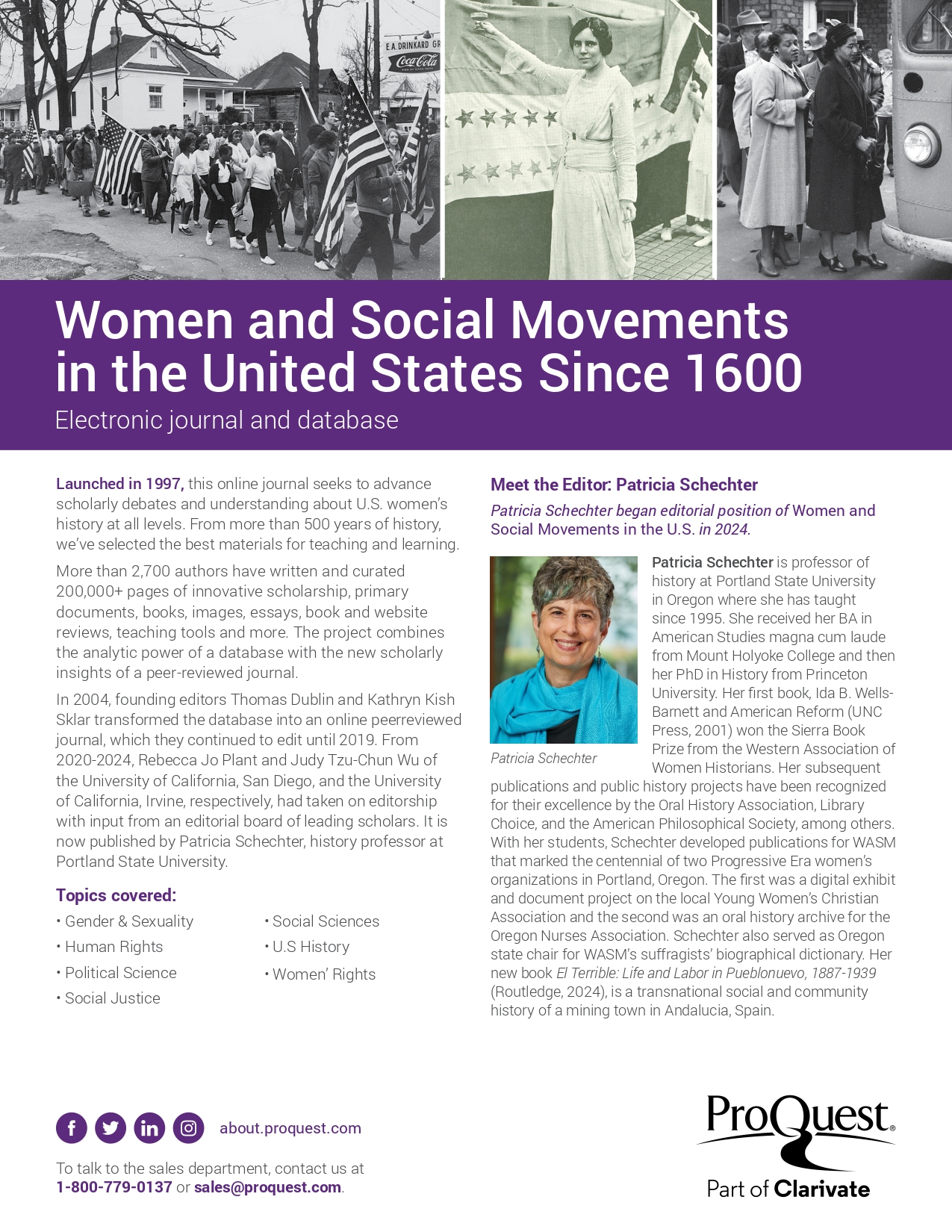 Women and Social Movements in the United States Since 1600
Women and Social Movements in the United States Since 1600 -
 Women and Social Movements: Development and the Global South, 1919–2019
Women and Social Movements: Development and the Global South, 1919–2019 -
 British and Irish Women's Letters and Diaries: Second Edition
British and Irish Women's Letters and Diaries: Second Edition -
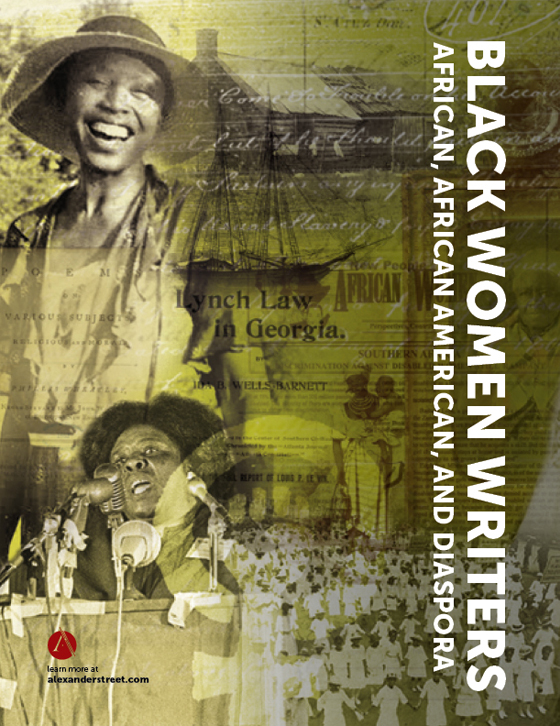 Black Women Writers
Black Women Writers -
 Latin American Women Writers
Latin American Women Writers -
 American History in Video
American History in Video




